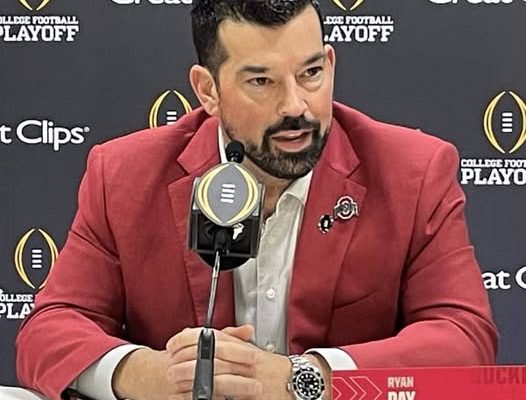ESPN’s latest college football coaching rankings have sparked a firestorm across the landscape of the sport, particularly after analyst Bill Connelly controversially declared Ohio State’s Ryan Day as the best coach in college football. In a piece that was intended to evaluate and spotlight coaching performance, consistency, and overall program impact, Connelly’s bold statement has triggered reactions that range from outrage to outright disbelief—especially among fans, media, and coaching staffs from rival powerhouses like Georgia, Notre Dame, Alabama, LSU, and Tennessee.
Ryan Day, who took over as Ohio State’s head coach in 2019 following Urban Meyer’s retirement, has compiled a remarkable win-loss record during his tenure. However, detractors quickly pointed to his underwhelming performances in the most critical games, particularly against Michigan in the past three seasons, and his inability to win a national championship despite having NFL-ready rosters and elite recruiting classes. Yet, despite these shortcomings, ESPN’s Connelly elevated him above names like Kirby Smart, Nick Saban, and Brian Kelly, all of whom have achieved far more in terms of playoff success and championship hardware.
The most glaring rebuttal came from Georgia fans and insiders, who have witnessed Kirby Smart build the Bulldogs into a legitimate dynasty over the past several seasons. Smart has produced two national titles in the last four years, made three national championship game appearances, and consistently brought in top-three recruiting classes. To his supporters, there is simply no comparison. Kirby has out-schemed opponents on the biggest stages, developed elite talent on both sides of the ball, and is seen as the new standard of college football excellence in the post-Saban era. Smart’s defenders argue that he has done more with less time and fewer slip-ups than Day, and point to Georgia’s tougher schedule in the SEC as further validation of his superior résumé.
Notre Dame fans, meanwhile, were baffled that Marcus Freeman was left out of serious contention in the conversation, especially after his meteoric rise and what many see as a transformative impact on the Fighting Irish. Freeman, who took over under difficult circumstances following Brian Kelly’s exit to LSU, has restored pride and discipline within the Notre Dame program. Though his record doesn’t yet rival that of other top-tier coaches, his leadership qualities, defensive genius, and ability to recruit nationally have made him one of the fastest-rising stars in college football. The sentiment in South Bend is clear—Freeman deserves more recognition and would have been a much more reasonable pick than Ryan Day, who many believe has plateaued and is riding on the coattails of a program built by his predecessor.
Tennessee’s camp was also livid. Josh Heupel has revitalized a long-dormant Volunteers program and turned it into one of the most electric offenses in the nation. After leading Tennessee to a historic win over Alabama and finishing with an 11-2 record in 2022, Heupel positioned the Vols as SEC contenders again, something that hadn’t happened in years. Tennessee fans feel that Heupel has done more with less and has achieved significant program overhauls in a shorter time frame compared to Day. They argue that Day inherited a finished product in Columbus and has yet to push it over the finish line, while Heupel took over a chaotic, scandal-ridden Tennessee team and made it relevant again.
Even more heated reactions came from Alabama, where fans and analysts laughed off the idea of Day being placed above the legendary Nick Saban. While Saban’s teams may have recently hit a few speed bumps by his standards, he still holds seven national championships, has churned out countless NFL stars, and has revolutionized the sport multiple times with schematic innovation and recruiting dominance. Saban’s defenders see ESPN’s ranking as disrespectful and premature, and believe that Day has not yet proven himself on the level of coaching royalty.
Critics also point to Day’s most glaring flaw—his struggles in rivalry games. The last three seasons have all ended in painful losses to Michigan, with some accusing Day of being out-coached, out-toughed, and out-prepared each time. For a coach at Ohio State, where “The Game” defines legacies, these losses sting especially hard. They’ve not only cost the Buckeyes Big Ten titles but also derailed championship dreams and playoff seeding. To many fans, no amount of regular season wins can erase the failure to beat Michigan when it matters most. The idea that a coach who is 1-3 against Michigan in his last four attempts could be labeled the best in college football strikes many as absurd.
Furthermore, there’s growing suspicion that ESPN’s ranking was designed more to provoke reaction than to offer a truly analytical view. Critics argue that ESPN and Bill Connelly thrive on the engagement that comes from controversial takes, and naming Day No. 1 is sure to generate clicks, tweets, and arguments on every sports talk show in America. If that was the aim, they succeeded. But if the goal was a fair assessment of coaching excellence, many feel the ranking falls far short of reality.
Adding fuel to the fire, former players from rival programs have chimed in on social media to voice their confusion and ridicule. Ex-Georgia players posted memes mocking the ranking, while past Notre Dame and Alabama players made comments about “media bias” and how the Big Ten often receives unearned credit in preseason polls and narratives. Even some Ohio State alumni were hesitant to fully back the ranking, with several pointing out that Day has room to grow and improve before being placed atop such a prestigious list.
It’s also worth noting that Ryan Day’s biggest supporters argue that he’s been unfairly maligned. They claim that his recruiting is unmatched—having landed multiple five-star quarterbacks, wide receivers, and offensive linemen in back-to-back classes. His offensive system is consistently among the most productive in the nation, and Ohio State remains one of the few programs that can legitimately challenge SEC supremacy. They argue that one or two missed opportunities shouldn’t erase the consistency and excellence Day has maintained, including three College Football Playoff appearances and multiple top-10 finishes.
Another angle of defense is that Day has modernized Ohio State in key areas, including player development, NIL management, and sports science. His willingness to adapt and embrace change is viewed by some insiders as forward-thinking, especially compared to older coaches who might resist the evolution of the game. Furthermore, Day’s demeanor, culture-building, and rapport with athletes make him a strong leader, even if he hasn’t yet reached the mountaintop.
Yet even among those sympathetic to Day, the idea of him being ranked as the absolute best in the sport seems to stretch credibility. Most acknowledge that he belongs somewhere in the top tier of college football coaches—perhaps among the top five—but bestowing him the crown while Kirby Smart reigns supreme and Nick Saban still lurks is, to many, either irresponsible or agenda-driven.
At its core, this debate exposes the deeper tensions and tribalism that have always existed in college football. Fanbases are passionate, territorial, and deeply invested in the success of their programs. When ESPN or any national outlet appears to give undue credit to one coach at the expense of another, it taps into these sensitivities and magnifies longstanding rivalries. Ryan Day being labeled the best isn’t just a coaching debate—it becomes a referendum on Ohio State’s place in the sport, the perceived bias of the media, and the ongoing cultural war between the Big Ten and the SEC.
Moreover, the ranking comes at a pivotal moment in the college football calendar. With the 2025 season fast approaching, media days wrapped up, and fall camps in full swing, fans are hungry for narratives. ESPN may have found the perfect match for offseason noise, but in doing so, they’ve made Ryan Day the most scrutinized coach heading into the season. Every play call, every sideline reaction, and certainly the result of the Michigan game will now be judged through the lens of ESPN’s claim.
If Ryan Day loses again to Michigan in 2025, this ranking could become an albatross. It will be revisited, dissected, and held up as yet another example of media hype failing to match on-field results. On the flip side, if Day finally overcomes Michigan and guides Ohio State to a national title, Connelly and ESPN will look prescient—visionaries who saw the potential before it fully crystallized.
Until then, the debate rages on. College football is, at its core, a sport of passion, perception, and pride. And nothing ignites those elements like a rankings list that crowns a man still searching for his defining win as the sport’s greatest coach. Whether it was ESPN’s attempt to be bold or simply a miscalculation, one thing is certain—this conversation is far from over.



